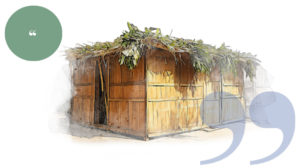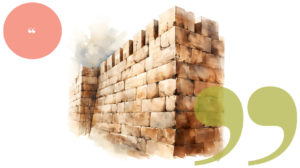Adviceline: Issue 106
| September 12, 2010As life continues, there are holes that will appear. To the degree that a person positively builds and develops themselves, those holes become filled.

I’m one of the last left from my group of single friends. My best friend is getting married and I find myself wondering: How I can keep and maintain a relationship with her now she will have completely different interests?
Below is a poem I wrote after this friend got engaged which helps express my feelings and fears:
Looking
Watching
As one more
Makes her way
Away …
Sitting
Alone
As they all
Walk down the path
Together …
Lonely
Forlorn
Waiting for just one
Phonecall …
Wondering
Maybe
There are still some
Memories …
Wanting
Needing
The old company
Of then …
Abandoned
Isolated
From the rest
Waiting …
Questioning
Thinking
Is it just pride
That did it?
Cheated
Exposed
Many lost secrets
Now gone …
Thinking
Hoping
Will I too, ever
Join them?
Promising
Assuring
That I will be
Different
Praying
Pleading
Hashem, please
Help me …
Strength
Perseverance
On the journey
Up ahead …
Understanding
Compassion
For all those
Left behind …
Authentic
Happiness
For all those
Leavers …
Rebbetzin Ruthy Assaf:
What you, and so many others, are dealing with is a very delicate balancing act. When a good friend gets married, there has to be understanding and stretching on both sides. The married friend has to remember what it’s like to be single, try to invite her single friend over, and think of shidduchim for her. The single friend has to be considerate of her friend’s new status, and act on that consideration.
Marriage is the biggest transition that a person will go through in her life. If your best friend is successful at building a bayis neeman, then she can only be your second best friend. Her first best friend will be her husband. And it’s important to understand this and be willing to step aside a bit while you let your friend build this type of relationship. If Chazal set the concept of shana rishonah, it means they recognized the importance of putting a great deal of time and energy into building the marriage, particularly during the first year. To the degree that your friendship was a real friendship, you will hopefully be able to rejoice in your friend’s good fortune, and allow her to focus her energies in the right place.
This will no doubt leave a bit of a hole in your life, but that’s an inevitable part of living. As life continues, there are holes that will appear. To the degree that a person positively builds and develops themselves, those holes become filled.
All this said, I don’t think you have to amputate the relationship — that would be painful and unnecessary. Simply because your friend is married, doesn’t mean the two of you can’t remain very close.
Hopefully, you will find your own zivug very soon, and will then understand, experientially, why marriage shifts the parameters of a friendship.
Rebbetzin Ruthy Assaf is the principal of Machon Yakov l’Bnos, Manhattan high school for girls. She is also a well-known lecturer and educator.
Dr. Rehavya Price
I was moved by your pain and the difficult feelings you expressed. A recurring theme in your poem is waiting. You speak about waiting in a very passive way. In my practice, I see many people in your situation and I encourage them to be proactive. There are four dimensions along which you can be proactive to change your situation and get what you want out of your life.
The most basic level is the physical one. This includes nutrition; diet; exercise; makeup; clothing; how you stand, smile, and present yourself. It may seem shallow to focus on this, but when you look your best you feel your best. The physical aspects are the first thing people notice, and if you are meeting someone for a short time on a date, it’s important that you make a good impression.
The second dimension is psychological. Self-esteem is very important. You need to believe that you are good and deserving, and will get the right shidduch at the right time. Some of the themes which come up in your poem were perfectionism, fear of commitment, fear of rejection, and/or abandonment. These may have been issues far before this point in your life. Now is the best time to get a handle on those feelings, to fully understand yourself, your strengths and challenges. This is the best time to do so, before you get married, so you can come into marriage as a more complete human being. I should point out that no matter how much you advance psychologically, as long as you are single, there will always remain a void. That final void will only be filled when you find the other half of your neshamah. That pain is what draws you into the process of shidduchim, and filling that void when you do get married will give you feelings of intense happiness.
The third dimension is spirituality. This period of your life calls for great faith. Finding a husband is a process you can’t control on your own. Realize that you are never alone, Hashem is guiding you. Now is a time to strengthen your tefillah. Believe He will bring you the right one at the best time, and that you are going through this for a reason.
The fourth dimension is social ties, and this returns to your question. It’s important to keep connected to people and to do kindness for as many people as possible. The early months of marriage can have some rough patches, and your married friends still very much need your friendship. In addition, married friends are often euphoric about marriage and will be highly motivated to help you find your own husband. Don’t leave them at this point. Reach out to other people as well and get a reputation as being a kind, giving person.
Tackling the problem on all four levels and changing yourself will be a transformative experience. If you feel good physically, emotionally, spiritually, and socially, you will radiate good will and happiness. This can’t help but attract people to you and will hopefully bring you to your goal of marriage that much faster.
Once you do find the right one, you will be able to combine your joy as a newlywed with your knowledge of the pain of those who are still single. Hopefully this will motivate you to pass on your gift, and try to find shidduchim for other singles. May this day come soon.
Rabbi Rehavya Price, MD is a Yale & Columbia University-trained Diplomate of the American Board of Psychiatry & Neurology specializing in a Mind-Body-Spirit Approach to Healing. He is on the faculty of Cornell Medical School/New York Hospital, and has a psychotherapy and psychopharmacology practice for teens, adults, and couples in Monsey, New York.
Mrs. Hannah Parnes
The pain of being left behind is universal but it doesn’t have to be compounded by the loss of a friendship. This is a common issue that many singles grapple with. Realize that it will take a few months for your friend to adjust to her married life. During the first half year or so, she will be putting the majority of her energy into the primary relationship that she is trying to build. However, after this initial period, she will come up for air and seek your friendship. A husband cannot fulfill all of one’s emotional needs, and she will need and want her relationship with you. As long as you give her time to adjust to marriage, your friendship should still be able to flourish.
While you wait for her, it is a good idea to find other outlets. Volunteer, attend shiurim, go places where you can find other singles. Keep busy and active. Try to build some new friendships, while you hold onto the old ones.
Regarding your concern about your friendship floundering since you no longer share the same interests, keep in mind that people are multifaceted. I assume that when you were both single, your friendship wasn’t build solely upon the fact that you shared the pain and loneliness of being single. You shared many other interests and commonalities. Build upon them now. Just like being single is just one small piece of who you are, so too, your married friend has many other facets to her life.
Even girls who get married at the same time will often find themselves in different situations. One may have married a boy in business and another a kollel fellow, but they can still find much to talk about, despite living different lifestyles. The point is to build on what you share, and minimize what you don’t.
Mrs. Hannah Parnes is a clinical social worker with thirty-five years of experience.
(Originally featured in Family First, Issue 106)
Oops! We could not locate your form.












